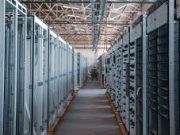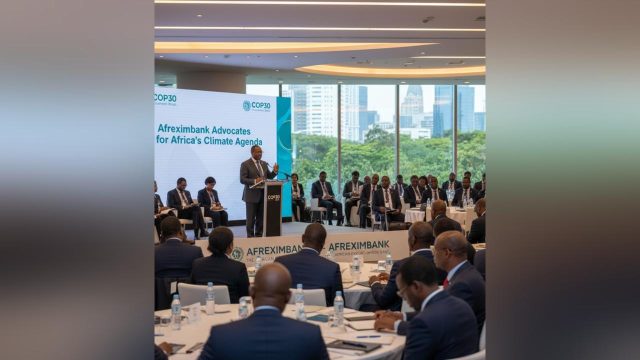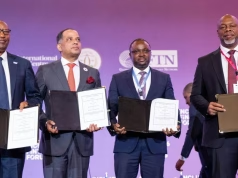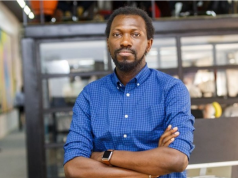At the 2025 United Nations Climate Change Conference (COP30) in Belém, Brazil, the African Export-Import Bank (Afreximbank) is advancing a bold and unified climate vision for the continent, one that centers Africa’s development priorities within the global climate discourse. With President Dr. George Elombi at the helm, the Bank’s delegation is championing an agenda that goes beyond mitigation to promote industrialisation, value addition, and equitable access to climate finance—marking a pivotal moment in how Africa positions itself on the world stage. This Afreximbank COP30 climate agenda reflects a growing demand: that climate action must serve African aspirations, not constrain them.
Rooted in the principles of Agenda 2063: The Africa We Want and amplified through the African Continental Free Trade Area (AfCFTA), Afreximbank’s engagement at COP30 emphasizes the urgent need for a pan-African climate narrative—one shaped by African leaders, institutions, and communities. The Bank is calling for coordinated action that links climate resilience with economic transformation, leveraging regional integration to build economies capable of withstanding environmental shocks while creating jobs and reducing poverty.
A central pillar of the Afreximbank COP30 climate agenda is the mobilisation of climate finance to support adaptation, particularly in vulnerable member states. Despite contributing less than 4% of global greenhouse gas emissions, Africa bears a disproportionate burden from climate disasters—from droughts in the Horn of Africa to floods in West and Central Africa. Afreximbank is pushing for the swift operationalisation of the Loss and Damage Fund, urging donor nations to fulfill their commitments and supporting African countries in building the institutional capacity needed to access these critical resources.
Equally important is the Bank’s push for a just energy transition. Over 600 million Africans still live without electricity—a reality Afreximbank insists cannot be ignored in global decarbonisation plans. The Bank advocates for a balanced energy mix that prioritizes renewable sources while recognizing the role of transitional fuels like natural gas in powering industrial growth and expanding energy access. This pragmatic approach ensures that Africa can address energy poverty without sacrificing long-term sustainability goals.
Beyond energy, Afreximbank is spotlighting Africa’s vast potential in strategic minerals and green value chains. Instead of exporting raw materials like lithium, cobalt, and manganese, the Bank is financing initiatives that enable full domestic processing—transforming Congolese lithium into batteries, South African manganese into components for clean tech, and Nigerian graphite into advanced materials. This shift not only captures more value within Africa but also fosters high-skilled employment and technological advancement.
Biodiversity is another underappreciated asset in Africa’s climate strategy. As one of the most ecologically rich regions on Earth, the continent plays a vital role in carbon sequestration and ecosystem resilience. Afreximbank is working with member states to develop frameworks that allow countries to monetise their biodiversity through carbon credits, conservation financing, and nature-based solutions—turning environmental stewardship into economic opportunity.
To drive these ambitions, the Bank is showcasing its flagship financial instruments, including the Afreximbank Trade Transformation Fund (ATTF), which de-risks and finances green industrial projects across the continent. At COP30, Afreximbank is hosting high-level dialogues, thematic panels, and side events—including sessions at the African Pavilion and a dedicated forum with Liberia on establishing a national carbon markets authority—positioning itself as a key architect of Africa’s climate finance architecture.
Commenting on the Bank’s mission at COP30, Mrs. Kanayo Awani, Executive Vice President for Intra-African Trade and Export Development, said:
“Our mission at COP30 is clear: to ensure that Africa’s voice is not only heard but acted upon. Our approach is one of proactive transformation—adding value to our rich mineral resources, powering our industries with a sustainable energy mix, and leveraging the AfCFTA to build resilient, integrated economies. We are using our influence to mobilise Global African capital and demand a globally recognised and supported framework for Africa’s just energy transition, ensuring that comprehensive climate action actively serves and reinforces Africa’s development and industrialisation goals.”
As the world debates net-zero timelines and carbon budgets, Afreximbank’s presence at COP30 sends a powerful message: Africa is not asking for permission to develop. It is demanding partnership, equity, and space to grow—greenly, inclusively, and on its own terms.
With this Afreximbank COP30 climate agenda, the Bank is not just participating in the global climate conversation—it is reshaping it.
Follow us on Instagram.
https://www.instagram.com/businessnewsng?igsh=ZXpweTdjOGF1ZXdu

























